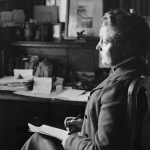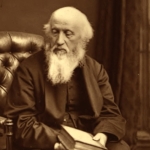[At Bethlehem, Pennsylvania]
What of this house with massive walls
And small-paned windows, gay with blooms?
A quaint and ancient aspect falls
Like pallid sunshine through the rooms.
Not this new country’s rush and haste
Could breed, one thinks, so still a life;
Here is the old Moravian home,
A placid foe of worldly strife.
For this roof covers, night and day,
The widowed women poor and old,
The mated without mates, who say
Their light is out, their story told.
To these the many mansions seem
Dear household fires that cannot die;
They wait through separation dark
An endless union by and by.
Each window has its watcher wan
To fit the autumn afternoon,
The dropping poplar leaves, the dream
Of spring that faded all too soon.
Upon the highest window-ledge
A glowing scarlet flower shines down.
Oh, wistful sisterhood, whose home
Has sanctified this quiet town!
Oh, hapless household, gather in
The tired-hearted and the lone!
What broken homes, what sundered love,
What disappointment you have known!
They count their little wealth of hope
And spend their waiting days in peace,
What comfort their poor loneliness
Must find in every soul’s release!
And when the wailing trombones go
Along the street before the dead
In that Moravian custom quaint,
They smile because a soul has fled.





















Comment form: